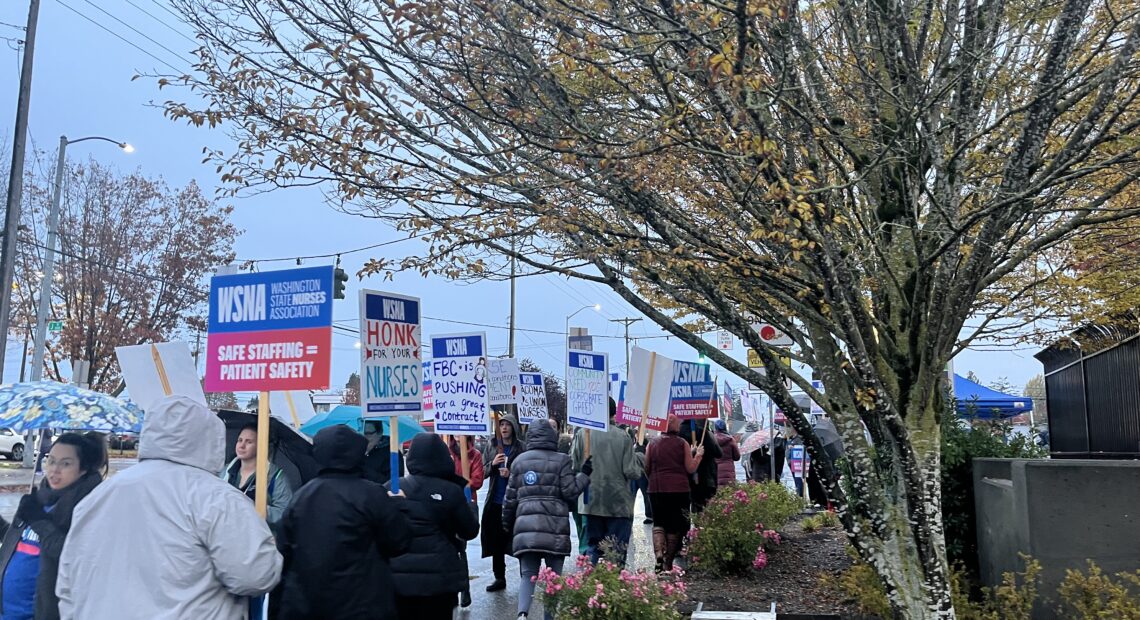
Nursing union at St. Joseph Medical Center in Tacoma reaches tentative agreement
Listen
(Runtime 0:59)
Read
Nurses at Tacoma’s St. Joseph Medical Center could soon have a new collective bargaining agreement with higher wages, improved safety measures in the hospital and some staffing mandates.
The bargaining team for the nurses reached a tentative agreement with the hospital after months of bargaining. This week, all employees at the hospital represented by the Washington State Nurses Association have a chance to vote on the contract.
“ I am feeling super positive overall. Our response from the entire bargaining nursing unit has been overwhelmingly positive,” said Sarah Guillen, a registered nurse and a member of the bargaining team. She’s worked in the hospital for 15 years.
In November, nurses held an informational picket after their previous contract ended without an agreement. Bargaining continued, but the two sides struggled to come to a consensus over multiple, day-long bargaining sessions.
Last week, two units in the hospital issued a 10-day strike notice. Shortly after, the hospital and the union reached an agreement. As a result of coming to a tentative agreement, the nurses’ union pulled its strike notice.
That strategy and continued late night, early morning discussions finally resulted in an agreement.
Going into negotiations, the top three priorities for the nurses were addressing staffing and safety issues, as well as ensuring the hospital’s pay was competitive.
The bargaining team reached an agreement that, according to Pamela Chandran, the director of legal affairs for WSNA, delivers on all three priorities.
From the outset, the bargaining team sought nurse-to-patient ratios specific to all of the units at St. Joseph. The ratios would set a maximum of how many patients each nurse could take.
Many hospitals, including St. Joseph, are short-staffed in the wake of the pandemic. Without fully staffed units, Guillen said the number of patients one nurse is taking care of is increasing. That means no breaks, rushing and the possibility of deciding which aspects of a patient’s care can be let go.
“That’s a scary thing because all aspects of a patient’s care are important,” Guillen said.
The union could not get the hospital to agree to staffing ratios. Instead, Chandran said the bargaining team focused on the biggest staffing problems. To ensure nurses get their regular meal and rest breaks, the hospital will have to staff at least 26 full-time break nurses, who take over patient care when a nurse goes on break.
If the contract is ratified, the hospital will also have to staff eight weekend-only nurses. These nurses work two, 12-hour weekend shifts and the tentative agreement necessitates that two of these nurses will be assigned to critical care.
At least five nurses recently filed complaints alleging that they were mandated to take additional on-call shifts when they were not assigned to work, which Guillen said is deeply disruptive to someone’s life.
“You have to be available and ready to go, and ready to work within 30 minutes, regardless of whatever else is going on in your life,” Guillen said.
The agreement establishes that a registered nurse is required to take only as many call shifts as the total number of shifts divided by the number of registered nurses when the unit is staffed according to the staffing plan. Managers can’t increase the required number of shifts per nurse if someone is on a leave of absence, is on vacation or if there’s an unfilled position.
A new Washington state law made it so that all hospitals had to put in place a staffing committee to work on such a plan at the beginning of 2024.
Nurses have expressed a number of safety concerns at the hospital, mainly with patients and visitors bringing weapons into the building. One nurse shared stories of disarming patients in the emergency department. Because of this, St. Joseph will be required, six months after ratification of the contract, to implement and staff a pilot weapons detection system in the emergency department.
WSNA was able to get this at another CommonSpirit facility, Virginia Mason Medical Center in downtown Seattle, last contract. This is the first such program at any of the nonprofit’s facilities.
Because it is a pilot program, the hospital could choose to continue or discontinue it. But, during the pilot, the hospital will have to provide reports to the union about weapons confiscated, which Chandran said will hopefully make the case for keeping it in place.
“If there is a reduction or a change in the way that staff is affected, we want to be able, at the beginning of the next contract cycle, to say, ‘This has helped, why would you take it away?’” Chandran said.
Over the course of the contract, the hospital will also have to install locking mechanisms on all units that do not currently have them.
Finally, if the contract is ratified, nurses at St. Joseph will see pay bumps putting them on par or above other hospitals in the Puget Sound region.
Every step position’s pay will be increased by a combination of a 4.75% pay bump, plus $1.50. Chandran said this approach is a big win for younger nurses, who will see their earning power increase quickly.
Nurses with longer careers at the hospital will be making some of the highest wages in the Puget Sound, even when compared to hospitals in Seattle. For example, nurses with 25 years of experience or more will make $86.94 an hour. The only hospital where nurses make more than that is Seattle Children’s, but those nurses have to be working 34 years to get that pay, Chandran said.
If the agreement is ratified, the hospital will also have to recognize nurses’ international work experience as equivalent to work experience in the United States. That was important to Guillen, who, like many of her colleagues, was educated and worked in the Philippines before coming to St. Joe’s.
“It’s nice to be credited to say, ‘Yes, we acknowledge the fact that you have a lot more experience than we admittedly credited when you came to us,’” Guillen said.
Although it’s not written in industry standard, it’s common practice for hospitals to only recognize half of the years nurses worked abroad. While experience in Canada or the United Kingdom is often credited equally, experience in countries such as the Philippines, India and Ghana is not.
“ Whether by accident or design, there was this institutional practice of wage inequity based on race and national origin, and that could not stand,” Chandran said.
Chandran said paying one person less for the same work as another person is an injury to all.
Guillen said already, other area hospitals bargaining or getting ready for bargaining are looking at the wins nurses made at St. Joseph to hopefully advocate for similar gains.“ That’s one of the things I absolutely love about nursing is that we really look at things as a team sport,” Guillen said. “If it can benefit one, it can benefit all of us.”
This week, nurses will get to vote on the agreement. The union said results will be available late on Thursday. If the contract is approved by nurses, it will go into effect immediately, with raises and other economic improvements beginning on Jan. 5.
A spokesperson for St. Joseph Medical Center directed all inquiries at this time to WSNA and did not answer questions sent over email.
The nurses at St. Joseph Medical Center ratified the contract Thursday night. Ninety-three percent of those who voted, voted in favor.
UPDATE: This story has been updated with information about the contract ratification.
















